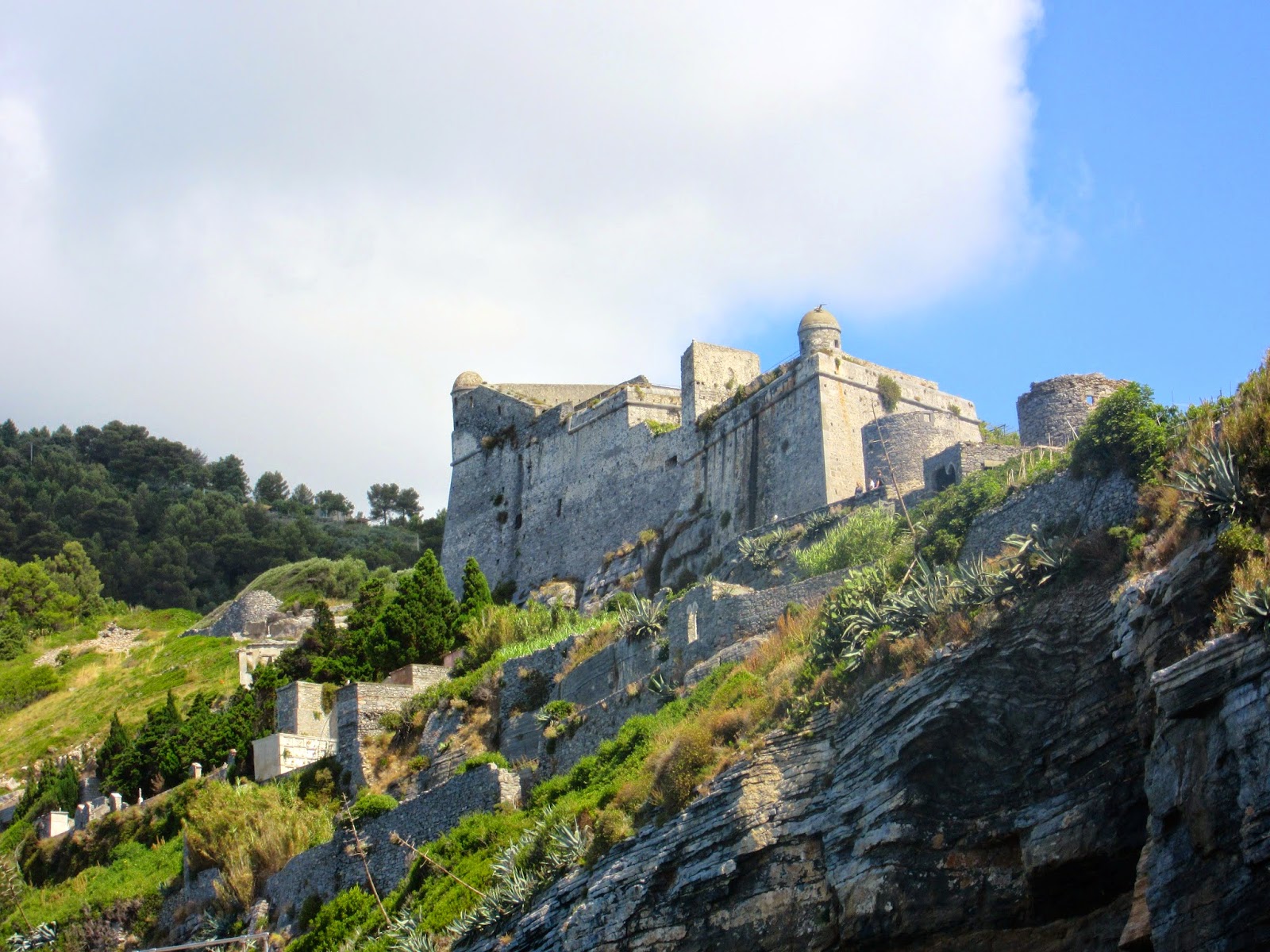A few years ago I fell in love with Villefranche-sur-Mer
on the French Cote d’Azur. Nothing can match the beautiful scenery and casual
ambience of a small seaside town. Now I’ve lost my heart to the charming village
of Porto Venere on the Ligurian coast of Italy. This stretch of coastline is
known as the Riviera di Levante, the coast of the rising sun.
 |
| Italian Naval Ships in the Gulf of La Spezia |
The waterfront of Porto Venere is lined with colourful multi-storey buildings and the flag of Genoa, capital
of Liguria, flies above the small boats in the harbour. There’s a
ticket booth on the dock for boat trips into the Cinque Terre and pine trees
shade the seaside promenade.
A medieval wall surrounds the oldest section of Porto Venere and the Latin inscription above the gate declares the village as a Colony of Genoa since 1113. Official Genoese measures of capacity stand next to the gate. Our guide pointed out the holes above the entryway used to pour boiling oil on unsuspecting attackers.
Houses in Porto Venere have two entrances,
one on the waterfront and another a few stories higher on the main street, Via
Capellini. Enclosed stairways link the quay with the street up above.
 |
| Porto Venere Stairway, Scala del 1º Capitolo |
The narrow streets of Porto Venere are called carrugi. They were designed to provide shade and protection from the wind.
 |
| Via Capellini |
 |
| The Narrow Streets, or Carrugi, of Porto Venere |
All along Via Capellini there are seafood restaurants featuring Ligurian specialties such as fresh mussels (muscoli) and anchovies (acciughe). Wine bars serve up the local Cinque Terre wines.
 |
| Fresh Fruit |
Souvenir shops sell olive oil and products made with olive wood; black and gold-veined portoro marble mined from local quarries; dried pasta like the stamped circular croxetti and twisted trofie; and my favourite pasta sauce.
 |
| Portoro Marble Souvenirs |
 |
| Pasta Curtains, Portovenere |
 |
| Croxetti, Trofie and Other Local Pasta |
Fragrant pesto sauce was invented in Liguria and it's made with basil, olive oil, pine nuts and parmigiano. I later enjoyed a plate of pasta with pesto for lunch in the Cinque Terre town of Monterosso al Mare.
 |
| La Bottega del Pesto, Porto Venere |
 |
| Tray of Fresh Basil |
 |
| Pesto Sauce, La Bottega del Pesto |
Just off Via Capellini is a tiny square, Piazza Paolo Centinaro. The Fountain of Lions now stands over an old public well that was built to collect rain water.
 |
| Fountain of Lions, Piazza Paolo Centinaro |
At the end of sheltered Via Capellini the street opens out onto Piazza Spallanzani and I’ve never seen anything like it – sun, sky and sea all coming together on a vast terrace of stone. Sunbathers cluster on the rocks below Torre di Gian and Castello Doria crowns the hilltop.
 |
| The End of Via Capellini |
 |
| Sunbathers in Porto Venere |
Straight ahead is the 13th
century Chiesa di San Pietro (Church of St. Peter) sitting atop the rocky promontory.
The church’s black and white striped marble façade is typical of the local
Gothic architecture. A Roman temple to the goddess Venus once occupied this
spectacular site above the waves and gave Porto Venere its name.
A window in the sun-baked stone wall frames
the view of a bay where Lord Byron used to swim. Byron’s Grotto is a cave which
long ago collapsed and the sign refers to Byron’s legendary swim across the
Gulf of la Spezia to visit his friend Percy Shelley in Lerici.
 |
| Window Overlooking Byron's Grotto |
My visit to Porto Venere was a brief introduction to the town as we were only beginning a full day of travel. Another boat would soon take us to the rugged and remote Cinque Terre (Five Lands) thirty kilometres up the coast.
 |
| Church of St. Peter, Porto Venere |
UNESCO has designated Porto Venere and the neighbouring Cinque
Terre villages as a World Heritage Site. And though I was excited to
embark on the next leg of our journey I hope that I return one day to lovely Porto Venere.
Next: Cinque Terre: the Five Lands
Next: Cinque Terre: the Five Lands
Related Posts:
































Faye, I really enjoyed looking at your beautiful photos, it bought back memories of my solo journey to Italy in 2007, what a dreamy place, I still,have the label from the jar of pesto from that Gorgeous shop!
ReplyDeleteAdrienne from Brisbane
Thanks so much, Adrienne. I didn't buy any pesto as we were doing a lot of travelling that day but I'll bet you enjoyed it.
Delete